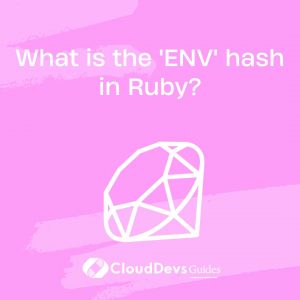What is the ‘ENV’ hash in Ruby?
In Ruby, the `ENV` hash is a built-in global hash-like object that provides access to environment variables. Environment variables are a way to store configuration settings, sensitive information, and system-wide parameters that can be accessed by various processes and programs running on your computer.
Here’s what you need to know about the `ENV` hash in Ruby:
- Access to Environment Variables:
The `ENV` hash acts as a bridge between your Ruby code and the environment in which your code runs. It provides a simple and convenient way to read and write environment variables directly from your Ruby programs.
- Key-Value Pairs:
Environment variables are stored as key-value pairs, where the keys are the names of the variables, and the values are their corresponding values. For example, you might have an environment variable named `DATABASE_URL` with a value containing the connection details for a database.
- Reading Environment Variables:
To access the value of an environment variable, you can use the `ENV` hash with square brackets and the variable name as the key. For instance:
```ruby database_url = ENV['DATABASE_URL'] ```
This code retrieves the value of the `DATABASE_URL` environment variable and assigns it to the `database_url` variable.
- Writing Environment Variables:
While the primary use of the `ENV` hash is reading environment variables, you can also modify or set environment variables using this hash. However, changes made to environment variables using Ruby code are typically only visible to the current Ruby process and its child processes.
- Security and Best Practices:
Environment variables are often used to store sensitive information like API keys or database credentials. It’s crucial to handle them securely, never hardcoding sensitive data in your code. Instead, load sensitive information from environment variables, which helps keep your credentials safe and allows for easy configuration changes in different environments.
- Platform Independence:
The `ENV` hash is available across different platforms, including Unix-like systems (Linux, macOS) and Windows, making it a versatile way to handle configuration across various operating systems.
The `ENV` hash in Ruby is a powerful tool for managing environment variables, providing a standardized way to interact with system-wide configuration settings and sensitive data while ensuring platform independence and security in your Ruby applications.






